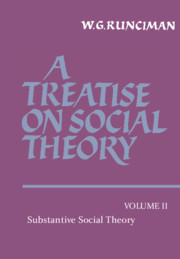2 - Social relations
Published online by Cambridge University Press: 10 January 2011
Summary
THE RANGE OF VARIATION
§1. To say that societies are fully defined by the itemization of their constituent roles is not to say that there is, as it were, a periodic table of ‘atomic’ roles. This is not only because cultural evolution, unlike chemical, is open-ended. It is also because the practices by which roles are in turn defined are not themselves tied to those roles in any determinate form. Not only are practices, not roles, the units of social selection, but the same role may be enacted through any one of several different sets of practices and the same practice may be an integral part of several different roles. As an example, consider again the role of a monarch. As I have already pointed out, monarchs, despite being invested with titles suggestive of supreme power, may possess markedly different degrees of it in the three different dimensions of social structure. But even if the role carries ultimate title to all of the society's material resources, unchallenged ideological supremacy at the summit of an ascriptive hierarchy of deference, and total control over the means of coercion, the nature of the practices involved may vary widely from case to case.
- Type
- Chapter
- Information
- A Treatise on Social Theory , pp. 61 - 122Publisher: Cambridge University PressPrint publication year: 1989



